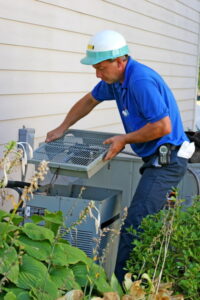With regular maintenance, an air conditioner should be able to keep your home cool and comfortable for at least ten years, and often more like fifteen. However, there are certain things that can lead to an early air conditioner death. Replacing your AC system is expensive and time-consuming. It’s far better to avoid that if you can! So what causes early AC failure? And how can you prevent it?
The key component here is the compressor. When that fails, chances are, your air conditioner is done for. Here’s why.
The Role of the Compressor
While the refrigerant is the substance that absorbs heat from your home and releases it outside, and the coils are the component that the refrigerant travels through, the true air conditioning superhero is the compressor. Without it pressurizing the refrigerant, there would be no circulation, and no heat being absorbed and released. Your air conditioner would simply be an incredibly expensive fan.
When Compressors Fail
If your air conditioner is under warranty, it may be possible to have the cost of the compressor covered by the manufacturer. However, because the cost of this one critical component is so high, paying for it yourself is generally not a good investment.
If your air conditioner’s warranty has expired, or if you have failed to comply with conditions of the warranty agreement like having professional maintenance done annually, compressor replacement is not advised. It may be possible to replace the entire condenser, which is the outdoor unit, but often this causes more wear and tear and won’t last long because of a mismatch between the indoor and outdoor units. Often, compressor failure means you need a system replacement.
Preventing Compressor Failure
Prompt repairs whenever you suspect that your air conditioner is struggling is the best way to ensure that your compressor will not be compromised. Here are some key things to watch out for.
- Refrigerant leaks: Hissing, bubbling, ice on the evaporator coils, and decreased effectiveness can all signal loss of refrigerant. With insufficient refrigerant, the compressor will struggle harder and harder until it burns itself out.
- Lack of lubrication: During maintenance, the compressor’s motor is lubricated. Without maintenance, friction in the motor will increase, causing it to overheat.
- Dirty coils: The condenser coils in the outdoor unit can easily become caked with dust and dirt or crowded with debris such as lawn clippings or last fall’s dead leaves. This insulates them, preventing the heat from being released. The inability to cool down raises the pressure of the refrigerant and can seriously strain the compressor.
- Blocked suction line: The only sign of this may be a marked drop in cooling power, so don’t delay in getting it repaired if that happens to your air conditioning in Houston. A blockage can cause refrigerant to back up into the compressor, which can quickly destroy it.
Save your compressor—and your air conditioner—from a tragic fate by always getting prompt, professional repairs as soon as you notice a problem.
Reach out to Cool Care Heating and Air Conditioning, The Best Care for Your Air.

